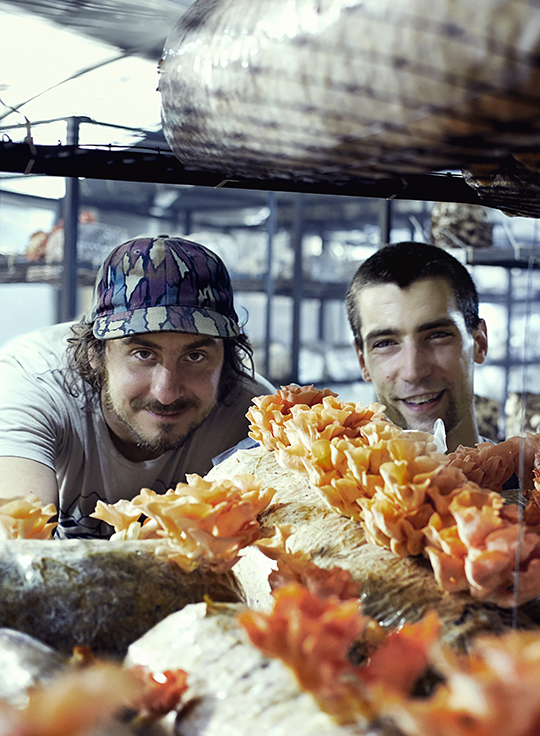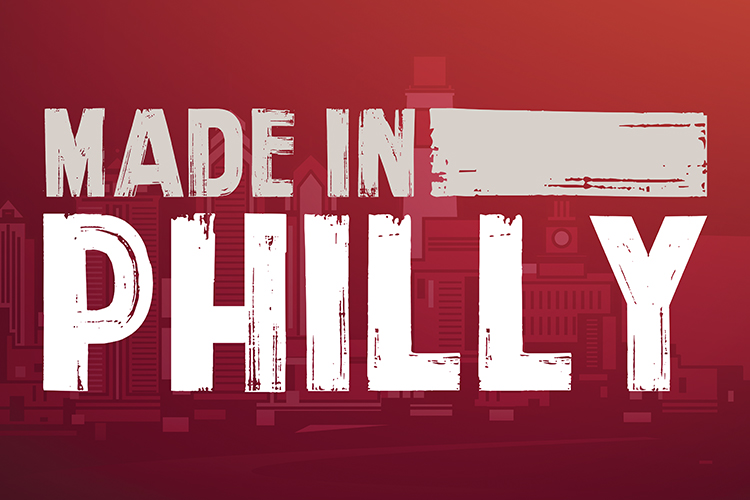Photo by Mark Likosky | Brian Versek and Dan Howling in their Northeast Philadelphia mushroom growing facility.
by Emily Teel
Mushrooms grow from a network, a web of interconnected genetic information called mycelium. Even though it’s invisible to the human eye, soil mycelium is constantly growing, individual spores sending out threads called hyphae and building connections to one another. Something similar happened when Dan Howling, Brian Versek and Tyler Case met. Mycopolitan, Philadelphia’s first mushroom farm, is the result.
Long before they became farmers—Case started growing when he was still a teenager—each had become so enamored with mushroom cultivation that it would be unfair to call them hobbyists. They’d rig small home labs to isolate specific mushroom strains and grow them in sterile conditions. “We plunged ourselves into the entirety of cultivation” recalls Versek, “[into] the propagation of mycelium, culture work, inoculation and fruiting—all in small greenhouses in our basements or our bedrooms or living rooms.”
When Case met Versek, a coworker and fellow researcher in 2008 at a Treatment Research Institute methadone clinic, Case was already an avid mushroom grower, forager and volunteer teacher of mycology at Saul High School. Case pushed Versek to the next level, and when a mutual friend put them in touch with Howling in February of 2014, the trio talked as only mushroom growers can. “It’s probably boring for everybody else in the room,” says Versek. “All of a sudden, you’re speaking a language that most other people don’t understand.”
They voiced agricultural aspirations, but none of the three men—nor their fourth business partner Dave Novak—had an agricultural background, and they didn’t want to follow the model of the big mushroom producers that make Kennett Square famous. “As residents of Philly, we didn’t want to leave this place,” says Versek. “We love it here.” So, instead of moving to Chester County, the group started looking closer to home.
Philly’s first mushroom farm is hidden in plain sight. Just like wild mushrooms growing in the woods, you have to know where to look in order to find your prize. Mycopolitan grows beautiful mushrooms in the basement of Common Market, a food distribution warehouse at D Street and Erie Avenue that runs the Philly Good Food Lab project, a cooperative work space for local food businesses. “Being underground gives [us] more control,” says Versek. He explains that the “thermal mass of giant concrete walls” do some of the work of maintaining a consistent temperature and humidity, which means less energy is spent on heating and cooling the room to the temperature range the mushrooms need to flourish.
And flourishing they are. Mycopolitan began growing in October of 2014. Now, though still very much a start-up, they sell their specialty mushrooms to restaurants like Honest Tom’s Taco Shop, Kensington Quarters, and the Farm and Fisherman. Philly restaurants can count on Mycopolitan for speedy deliveries of high-quality mushrooms, but the fact that Mycopolitan is shortening the distance between farm and table is only part of how the owners envision a more sustainable city.
“The biggest thing is our general enthusiasm about the expansive possibilities inherent in mushrooms,” says Versek. In forests, the mycelial network that mushrooms create within the soil facilitates the growth of trees, builds soil structure and helps hold ground water. Here in the city, the trio envisions growing mycelium as another kind of foundation: an opportunity to build community, feed people healthy food, educate the public and support urban green space.
Still in their first year of farming, they’re already working to create opportunities to integrate their agricultural production with these larger goals, including teaching workshops on mushroom cultivation. The group is especially excited about a collaboration with the Philadelphia Orchard Project to add edible fungi into the permaculture design of the organization’s food forests, producing a delicious harvest of wild cultivated mushrooms. “They’re already simulating a forest ecosystem,” says Versek. He says the mushrooms are a perfect fit to break down the sheet mulch of wood chips, “providing that missing link between life… and decomposition.” Often thought of as the decomposers of the biological world, mushrooms are actually reinventors; mycelium transform the media in which they grow.
“Mushrooms are under the radar; they work in secret, underground,” says Versek, “They do a lot of hidden work that we, as human beings, take for granted.”






